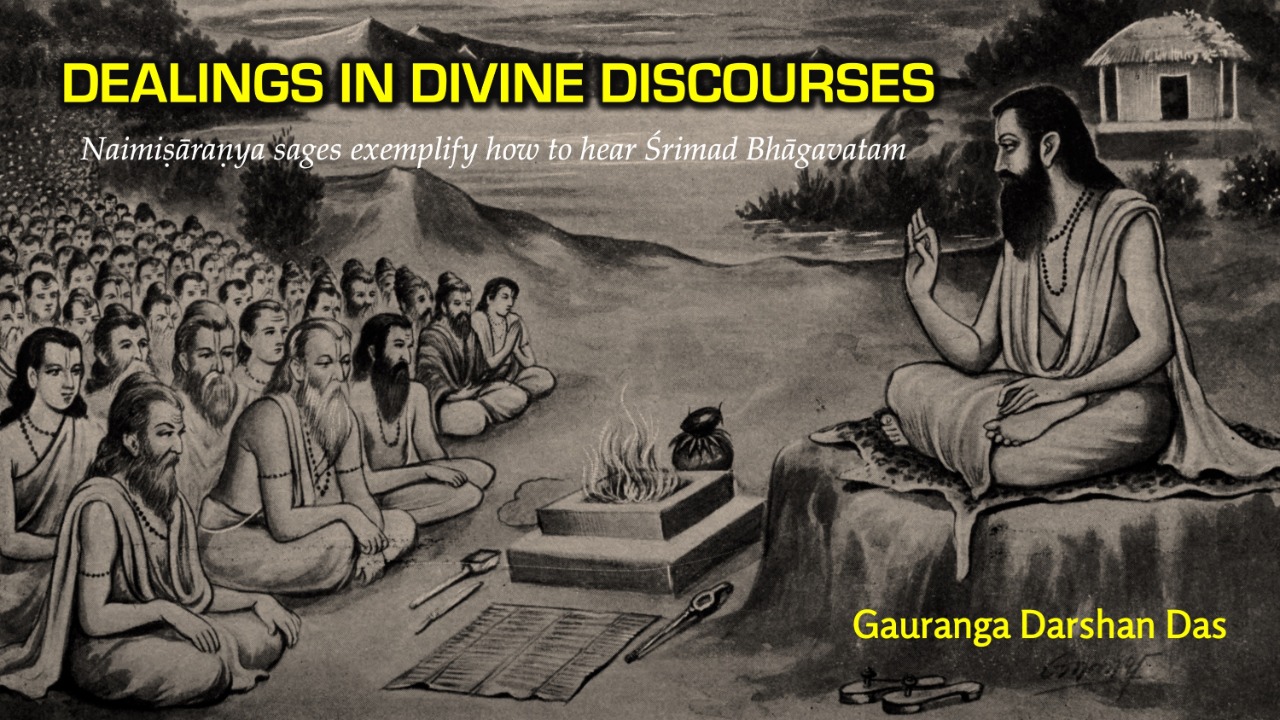Dealings In Divine Discourses
Six Qualities exhibited by Naimiṣāraṇya sages in their hearing of Śrimad Bhāgavatam
by Gauranga Darshan Das
Śrīmad Bhāgavatam is a literary masterpiece like no other. It is rich with sacred wisdom and is presented as an amalgamation of intriguing spiritual conversations. Thus, Śrīmad Bhāgavatam reigns supreme in genres of spirituality, philosophy and devotion. While Śukadeva Gosvāmī is the foremost speaker of the Bhāgavatam, Parīkṣit Mahārāja is its foremost hearer. Their conversation, the Śrīmad Bhāgavatam, was presented by Sūta Gosvāmī to the sages headed by Śaunaka, at a forest called Naimiṣāranya. As the sages asked questions about various spiritual subjects including philosophy of life, purpose of creation, nature of reality, God and His incarnations, humanity’s quest for happiness and so on, Sūta Gosvāmī answered their inquiries based on what he had heard from his guru Śukadeva Gosvāmī.
Spiritual knowledge is acquired by putting forward relevant questions in front of an experienced and realized speaker, and hearing the authorized answers with the intention to adopt the wisdom. Śravaṇam or hearing the Bhāgavatam spiritually uplifts the sincere audience who lends their ear in proper consciousness. Grateful enthusiasm, genuine inquisitiveness and sincerity of purpose in the hearer, inspires the qualified speaker, and consequently extracts the nectar of the Supreme Lord’s glories from them. Such worthy exchanges become enlightening for humanity.
The sages of Naimiṣāraṇya delineate the essential qualities of a speaker and a hearer of the Bhāgavatam in the following verse (SB 1.18.15).
tan no bhavān vai bhagavat-pradhāno
mahattamaikānta-parāyaṇasya
harer udāraṁ caritaṁ viśuddhaṁ
śuśrūṣatāṁ no vitanotu vidvan
An authentic speaker of the Bhāgavatam is bhagavat-pradhāna, one who keeps Lord Kṣṛṇa as the chief object of one’s love, and a credible hearer of the Bhāgavatam is śuṣrūṣatāṁ, one who is very receptive and anxious to hear about the Lord. At the same time, the subject discussed between them is also characterized as harer udāraṁ caritaṁ viśuddhaṁ, i.e. magnanimous and pure narrations about the Supreme Lord Kṛṣṇa.
We can learn from the sages of Naimiṣāranya, the spirit of hearing Śrīmad Bhāgavatam. The following are some of the glorious qualities they exhibited in their hearing.
1. Respect for the Speaker
The sages welcomed and honored Sūta Gosvāmī and offered him a seat of esteem. Being aware of his greatness, they praised his purity (saumya) and submissiveness (snigdha) to his gurus, which enabled him to become well versed with the essential knowledge of all scriptures (SB 1.1.4-8). While appreciating the qualities of Sūta Gosvāmī, the sages also exhibited those qualities and thus received the knowledge of the Bhāgavatam from him.
Śrīla Prabhupāda writes, “The proper method for receiving this transcendental message is to hear it submissively. A challenging attitude cannot help one realize this transcendental message. The desire to sincerely hear is the first qualification.” (SB 1.1.2 Purport)
It is not just intelligence or scholarship that enables one to comprehend the Bhāgavatam, but it is simplicity and submissiveness to the guru that allows one to truly understand this great literature, which is non-different from Kṛṣṇa.
2. Eagerness to Hear
The sages expressed their great enthusiasm to hear (śuśrūṣamāṇānām) about the pastimes of Supreme Lord and His incarnations (1.1.13). They had deep faith (śraddadhānānāṁ) in the narrations of the Lord and the purifying potency of the process of hearing His glories (1.1.17, 2.3.14). With such eagerness and faith, they attentively heard the words of Sūta Gosvāmī and presented various relevant questions to further elucidate the subject matter. Their inquisitiveness about specific details of various pastimes and philosophical subjects showed their veritable interest in inquiring from a worthy speaker. Thus, they timely and submissively raised questions to Sūta Gosvāmī on various topics. In reciprocation, Sūta Gosvāmī wholeheartedly appreciated their eagerness to hear Kṛṣṇa’s topics which alone can completely satisfy the hearts of everyone.
Śrila Prabhupāda writes, “Those who listen to the Bhāgavatam may put questions to the speaker in order to elicit the clear meaning, but this should not be done in a challenging spirit. One must submit questions with a great regard for the speaker and the subject matter.” (SB 1.1.5 Purport)
3. Faith in the Subject
The sages had full faith in the process of hearing Hari-kathā for the highest degree of spiritual emancipation. As Śaunaka declared, “Any activity other than hari-kathā steals away one’s lifespan with the rising and setting of the sun. Animalistic people whose ears have never heard about Kṛṣṇa are glorified by those people who are like dogs, pigs, camels and donkeys. Their ears are like snake holes. The tongues of those who don’t praise the Lord are like tongues of frogs.” (SB 2.3.17-20)
āyur harati vai puṁsām udyann astaṁ ca yann asau
tasyarte yat-kṣaṇo nīta uttama-śloka-vārtayā
The sages were not looking for some spiritual entertainment through enthralling stories, neither were they speculative armchair philosophers. They were chaste and wanted to faithfully hear only those topics that related to the Supreme Lord Kṛṣṇa and His devotees (1.16.5-6). In so doing they were not dismissive of life stories of some historic personalities or activities of some devotee of bygone ages. So long the subject was related to the Supreme Lord or His devotees, the sages were keenly eager to show it the same respect as they did to the direct topics of Kṛṣṇa’s activities. They had full faith that only by hearing such topics can one be purified and delivered from nescience.
Thus the sages maintained very high regard for the devotees of the Lord. They eagerly heard about such devotees and themselves glorified Parīkṣit Mahārāja, Śukadeva Gosvāmī and various other devotees whose topics Sūta Gosvāmī was narrating.
4. Compassion on others
The sages were compassionate towards the entire humanity in general, and Kali yuga people in specific. For this purpose, they had earlier begun a thousand-year sacrifice for the welfare of all humanity. Upon meeting Sūta Gosvāmī, the first question they had asked him was, “What is the ultimate good for people in general?” Foreseeing the incompetence of the people in the present age of Kali to understand the vast Vedic scriptures, the sages had requested Sūta Gosvāmī, “Please describe the essence of all scriptures.” As an answer to their inquiries, Sūta Gosvāmī had unequivocally announced: “Bhakti or unmotivated and uninterrupted loving devotional service unto Lord Kṛṣṇa is the only ultimate good for all people and is the essence of all scriptures.”
Appreciating the compassionate nature of the sages, Śrīla Prabhupada writes, “Forgetful men do not know the right path for peace and prosperity. However, the sages know it well, and therefore for the good of all men they are always anxious to perform acts which may bring about peace in the world. They are sincere friends to all living entities, and at the risk of great personal inconvenience they are always engaged in the service of the Lord for the good of all people.” (SB 1.1.4 Purport)
5. Gratitude for the Opportunity
A sincere hearer of the Bhāgavatam doesn’t ever take the opportunity to hear from a great soul for granted. They value such a glorious chance and are grateful for it at heart. They understand the superlative importance of their time and do not waste it for superficial things. The sages expressed their gratitude to Sūta Gosvāmī as follows:
tvaṁ naḥ sandarśito dhātrā dustaraṁ nistitīrṣatām
kaliṁ sattva-haraṁ puṁsāṁ karṇa-dhāra ivārṇavam
“We think that we have met Your Goodness by the will of providence, just so that we may accept you as captain of the ship for those who desire to cross the difficult ocean of Kali, which deteriorates all the good qualities of a human being.” (SB 1.1.22)
6. No Satiation in Hearing
A sincere hearer is never bored of hearing the Bhāgavatam despite hearing it repeatedly. Śrīla Prabhupāda writes, “Mundane news is static whereas transcendental news is dynamic, inasmuch as the spirit is dynamic and matter is static. Those who have developed a taste for understanding the transcendental subject matter are never tired of hearing such narrations. One is quickly satiated by mundane activities, but no one is satiated by transcendental or devotional activities.”
Addressing Sūta Gosvāmī, the sages of Naimiṣāraṇya humbly expressed their insatiate hearts as follows:
vayaṁ tu na vitṛpyāma uttama-śloka-vikrame
yac-chṛṇvatāṁ rasa-jñānāṁ svādu svādu pade pade
“We never tire of hearing the transcendental pastimes of the Personality of Godhead, who is glorified by hymns and prayers. Those who have developed a taste for transcendental relationships with Him relish hearing of His pastimes at every moment.” (SB 1.1.19)
Hearing Śrīmad Bhāgavatam is of great significance to the spiritual lives of all bhakti-yogīs. When such spiritual hearing is done in the right mood, following the footsteps of exemplary hearers of Kṛṣna-kathā, like the sages of Naimiṣāraṇya, one can quickly elevate one’s consciousness and gradually come to understand Lord Kṛṣṇa and His attributes.




